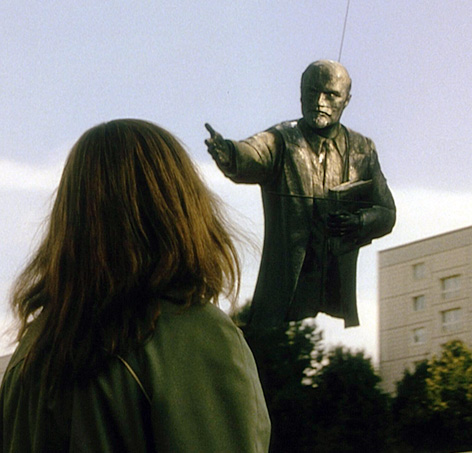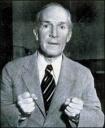childhood’s refugees: Goodbye Lenin!
A hilariously touching coming-of-age story, Goodbye Lenin! not only places the protagonists at a contemporary transitional threshold of very late teens/early twenties but also defines modern adulthood as taking control of the lie you live.
Germany’s unification is shown as something driven by youth who first fear an empty adulthood perpetually waiting for poor-quality necessities but are then left adrift by a first surge of capitalism that offers no adulthood at all, only menial jobs that fund ephemeral childish entertainments. The focus is on one family who, since the father’s defection into the West (and the arms of a western mistress), have been defined by their mother’s passionate Socialist activism. Ariane, a young mother, is forced to give up studying for an economics degree and experience the business world directly as a fast-food worker. Her little brother finds a job mocking his youthful dreams of following the East German cosmonaut Sigmund Jähn into space, selling satellite tv door to door. The wonder of outer space has been replaced by the capitalist utilitarianism of bringing massive spectator sports events to the dull-eyed masses, each in their separate boxes.
The speed of this change is striking. Their mother, Christiane, lies in a coma for only eight months (caused by the heart attack she suffered, seeing her son arrested for striking against the state she’d devoted her life to), but her children struggle to comprehend, let alone recreate, that former world to protect her fragile health. “I can’t believe we used to wear this shit,” Ariane complains, already missing her gaudy new clothes. All the food brands their mother requests have disappeared from shelves, driving Alex to dumpster-dive for old jars to sterilise and re-use.
Despite being set a generation behind the present, this film captures a very contemporary feeling better than any film set recently: how do young people grow up when the world they’ve been prepared for is wiped away in – seemingly – moments? My own generation, awkwardly perched between X and Y, was pushed to embrace technological education (with all the debt that brings) and specialise in order to be valuable as part of a well-paid, globalised, free-moving world workforce, and when we are at the age of these siblings, that crumbled with the same finality as the Cold War Eastern Bloc.
Despite the frantic improvisation required to keep his mother (possibly) convinced her beloved state is still functional, Alex comes to see the tiny world he’s made as a quiet haven from the chaos of change outside – just as his mother is able to get out of bed and takes a stab at reclaiming her independence by going outside. There she finds a riot of advertising, consumer goods, and most bizarrely telling, a statue of Lenin being airlifted out of the city (presumably to the scrapyard), seeming to wave solemnly to her as it passes. Does she realise now what has happened, is that why she is able later to tell her children that their despised father did not run away with another woman but emigrate, expecting her to follow with his family? Deeply frightened by the police interrogation and the likelihood of losing her children if she applied for a visa, Christiane had created and wholeheartedly embraced a fantasy that made the feared communist state a beloved protector that required her constant support. This gave her a meaningful life as the go-to person in their area for help with every small problem, but deprived her children of even their father’s letters, let alone presence, and she does not know whether she truly made the right choice.
Passing this burden on to her offspring is – along with Ariane and her partner’s new attitude toward being a parents rather than reluctant babysitters – a first indication they’ve become real adults. Christiane is able to die somewhat contented, even accepting someone else’s comforting fantasy, because Alex proves he can carry it. In order to camouflage the markers of change he couldn’t hide, he’d enlisted first his cinema-mad work partner and eventually an entire circle of friends to create fake newscast videos. The first claimed Coca Cola had been discovered to be a socialist invention of the 1950s (hence why the building across the way suddenly sprouted the iconic red banner); the second explained the world Christiane had wandered into as populated by West German refugees, desperate to escape the miserable life suffered under capitalism; and his final pièce de résistance incorporated both his childhood hero (once cosmonaut, now a taxi driver) as the new East German leader and actual footage of the Berlin wall being torn down – as West Germans poured into the city to embrace the potentials of socialism while rejecting the soul-killing goals of mindless consumerism.
Christiane drifts away while fireworks and celebrations break out in the streets below, letting herself believe they celebrate a humanitarian socialist unification (not knowing that newly united Germany’s football team had just won the World Cup). Her children will not achieve their dreams of space travel, but they have synthesized from East and West their own compassionate meanings to guide them through the chaos of change. It left me feeling quite sad, actually, seeing this just after the historic US healthcare bill finally passed, among a flood of reflexive selfishness and fear-mongering. Unlike this family, my own generation seems to have claimed a much darker and short-sighted set of meanings as our guiding star.

